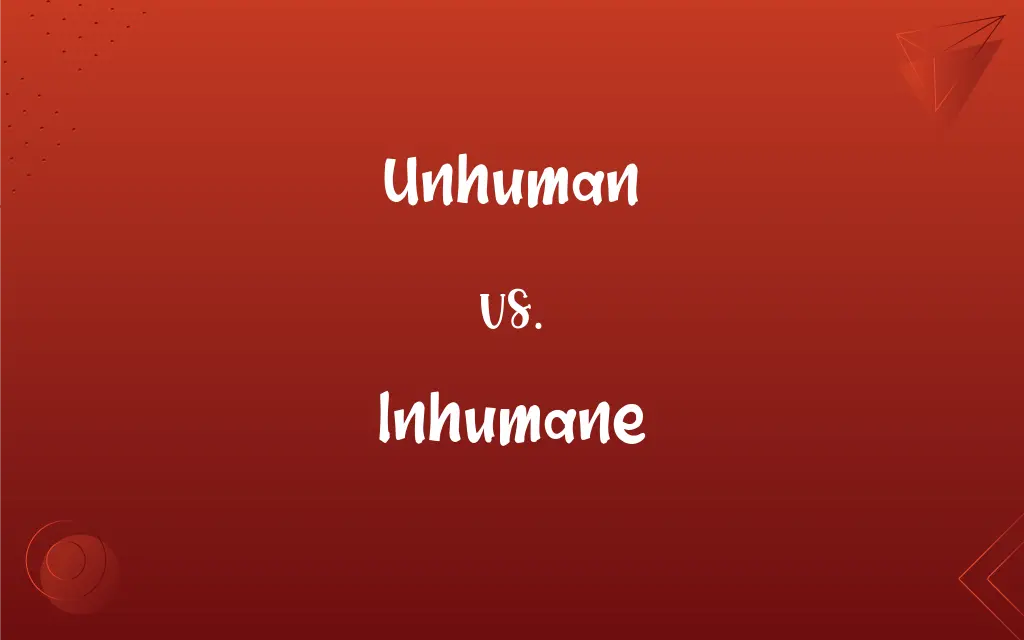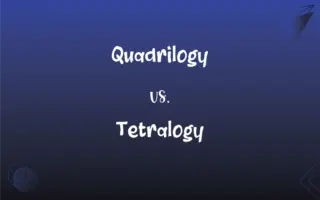Unhuman vs. Inhumane: What's the Difference?
By Janet White || Updated on March 4, 2024
"Unhuman" describes something not belonging to or resembling humans, focusing on characteristics or origins, while "inhumane" refers to a lack of compassion and cruelty towards humans or animals, emphasizing behavior or treatment.

Key Differences
The term unhuman is used to denote entities or qualities that are not human, do not resemble humans, or are beyond human characteristics. It often appears in discussions about the supernatural, artificial intelligence, or theoretical beings that lack human features or emotions. Inhumane, on the other hand, is a moral or ethical judgment about actions or conditions that show a lack of compassion, mercy, or decency. It typically describes treatment or behavior that is cruel, brutal, or neglectful, especially towards humans and animals.
The distinction between unhuman and inhumane is significant: one addresses the essence or nature of being (unhuman) and whether it relates to humanity or human qualities, while the other (inhumane) critiques the moral implications of actions or conditions. Understanding the difference is crucial for accurate communication, especially in discussions about rights, ethics, and the treatment of living beings.
Both terms serve different conceptual purposes: unhuman is useful in speculative fiction, philosophy, and discussions about what constitutes humanity or the essence of human-like qualities in non-human entities. Inhumane, however, is critical in advocating for ethical treatment, promoting compassion, and condemning cruelty in tangible, real-world scenarios.
Comparison Chart
Definition
Not belonging to, resembling, or characteristic of humans.
Lacking compassion or mercy; cruel or brutal treatment.
Context
Used to describe entities or qualities beyond human characteristics.
Used to describe actions, conditions, or treatments that are cruel.
ADVERTISEMENT
Focus
Nature or essence of being.
Moral and ethical judgment on behavior.
Usage
Common in speculative fiction, philosophy, and discussions on AI.
Common in legal, social, and ethical contexts regarding treatment of beings.
Examples
Unhuman creatures in science fiction.
Inhumane conditions in prisons or animal cruelty.
Unhuman and Inhumane Definitions
Unhuman
Not resembling humans in appearance or behavior.
The novel featured unhuman aliens with a completely different societal structure.
Inhumane
Showing a lack of compassion or empathy.
The inhumane treatment of prisoners sparked international outrage.
ADVERTISEMENT
Unhuman
Used in discussing the essence of what makes something human.
Philosophers debate whether consciousness is an unhuman trait.
Inhumane
Conditions that cause suffering or hardship.
Living in inhumane conditions, the refugees faced severe health risks.
Unhuman
Beyond human characteristics or understanding.
The unhuman intelligence of the AI surpassed all expectations.
Inhumane
Cruel and brutal behavior towards others.
Animal rights activists fight against inhumane practices in the meat industry.
Unhuman
Pertaining to supernatural or mythological beings.
Folktales often describe unhuman entities with magical powers.
Inhumane
Ethical judgment on actions causing unnecessary harm.
Using such tactics in warfare is considered inhumane.
Unhuman
Lacking human emotions or responses.
His unhuman calmness in the face of danger was unsettling.
Inhumane
Legal and social condemnation of cruelty.
Laws are in place to protect against inhumane acts.
Unhuman
Not resembling or having the qualities of a human being.
Inhumane
Lacking pity or compassion.
Unhuman
Not human; inhuman.
Inhumane
Alternative form of inhuman: lacking pity or compassion for misery and suffering; cruel, unkind.
Unhuman
Divested of human qualities or attributes
Inhumane
Not humane; lacking and reflecting lack of pity, kindness, or compassion; as, humans are innately inhumane; this explains much of the misery and suffering in the world; biological weapons are considered too inhumane to be used.
Inhumane
Lacking and reflecting lack of pity or compassion;
Humans are innately inhumane; this explains much of the misery and suffering in the world
Biological weapons are considered too inhumane to be used
FAQs
What is the importance of recognizing inhumane conditions?
Recognizing inhumane conditions is crucial for advocating for change, ensuring ethical treatment, and promoting compassion and dignity in society.
What makes an action inhumane?
An action becomes inhumane when it lacks compassion and mercy, causing unnecessary suffering or harm to humans or animals.
Are unhuman characteristics always negative?
Not necessarily; unhuman characteristics can be neutral or even positive, especially in contexts where they describe abilities or qualities beyond human limits, like enhanced intelligence or strength in fictional characters.
Can technology or AI be considered unhuman?
Yes, technology or AI can be considered unhuman when it exhibits capabilities or characteristics that surpass human abilities or when it operates without human-like emotions or limitations.
How is inhumane treatment addressed by law?
Inhumane treatment is addressed by laws and regulations that set standards for the ethical treatment of humans and animals, with penalties for violations to protect rights and dignity.
Can a person be described as unhuman?
A person can be described as unhuman in a metaphorical sense when they display qualities or abilities that are considered beyond typical human capacities, or in discussions critiquing what it means to be human.
What role does empathy play in determining if an action is inhumane?
Empathy plays a crucial role in determining if an action is inhumane, as it involves understanding and sharing the feelings of others, which guides judgments about what constitutes cruel or compassionate treatment.
What are some examples of inhumane treatment in history?
Examples of inhumane treatment in history include slavery, torture, genocides, and the inhumane conditions of concentration camps during World War II.
How does the treatment of the environment relate to inhumane actions?
The treatment of the environment can relate to inhumane actions when it leads to harm or suffering of living beings, highlighting the interconnectedness of environmental health, animal welfare, and human rights.
Is it possible for an action to be inhumane towards non-living entities?
While inhumane treatment typically refers to living beings, actions towards non-living entities can be considered inhumane if they indirectly cause harm or suffering to living beings, or if they violate ethical principles related to respect and dignity.
Why is it important to differentiate between unhuman and inhumane?
Differentiating between unhuman and inhumane is important for clarity in communication, ensuring accurate understanding of discussions around ethical treatment, supernatural or artificial entities, and the essence of humanity.
How do cultural perceptions of what is inhumane vary?
Cultural perceptions of inhumane treatment can vary based on societal values, legal standards, and historical context, leading to differences in what is considered cruel or unacceptable behavior.
How do personal experiences influence perceptions of inhumane treatment?
Personal experiences significantly influence perceptions of inhumane treatment, as firsthand or empathetic understanding of suffering can heighten awareness of cruelty and motivate advocacy for compassion and change.
How can individuals and societies work to prevent inhumane treatment?
Individuals and societies can work to prevent inhumane treatment by promoting education on rights and ethics, advocating for strong legal protections, and fostering a culture of compassion and respect for all beings.
How do scientific and technological developments impact our views on what is unhuman?
Scientific and technological developments, especially in biotechnology and artificial intelligence, impact our views on what is unhuman by challenging traditional boundaries between natural and artificial life, and prompting reevaluation of what qualities define humanity.
How do advancements in AI challenge our understanding of unhuman?
Advancements in AI challenge our understanding of unhuman by blurring the lines between human-like consciousness, emotions, and artificial intelligence, prompting debates on rights, ethics, and what it means to be truly human.
Can literature and art explore the concept of the unhuman?
Literature and art frequently explore the concept of the unhuman by imagining entities with qualities that transcend human limitations, offering insights into the human condition and the boundaries of human nature.
What ethical considerations arise from treating animals inhumanely?
Treating animals inhumanely raises ethical considerations about respect for life, the moral responsibilities of humans to ensure welfare and prevent suffering, and the broader impacts of cruelty on societal values.
Can societal norms and laws evolve to consider certain previously acceptable actions as inhumane?
Societal norms and laws can and do evolve to consider certain previously acceptable actions as inhumane, reflecting growing ethical understanding, changes in cultural values, and increased awareness of rights and welfare.
In what ways can exploring the concept of the unhuman enhance our understanding of humanity?
Exploring the concept of the unhuman can enhance our understanding of humanity by challenging us to consider what fundamentally defines human nature, the limits of human capabilities, and the ethical implications of transcending those limits.
About Author
Written by
Janet WhiteJanet White has been an esteemed writer and blogger for Difference Wiki. Holding a Master's degree in Science and Medical Journalism from the prestigious Boston University, she has consistently demonstrated her expertise and passion for her field. When she's not immersed in her work, Janet relishes her time exercising, delving into a good book, and cherishing moments with friends and family.































































